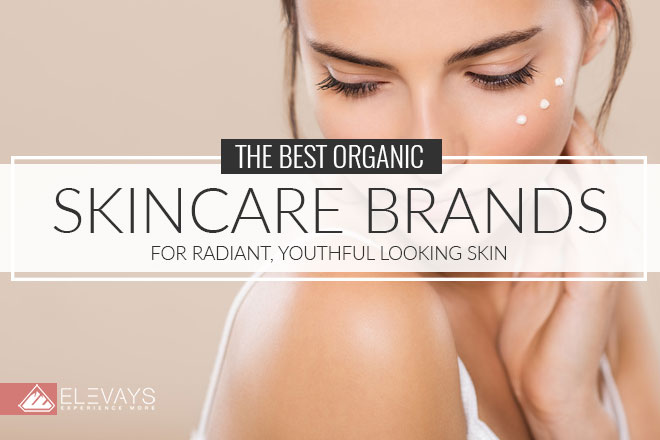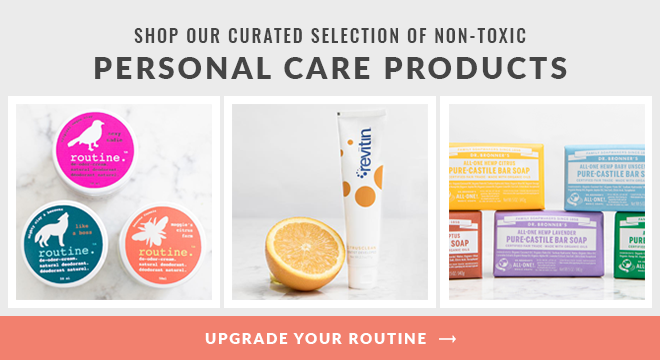Organic skincare has a bad reputation for being expensive and hard to find. However, I’d like to suggest that organics skincare’s bad reputation is nothing but an outdated myth! In fact, organic skincare brands can be affordable and what’s more, the cost of choosing to use conventional skincare outweigh what you might spend on organic skincare products up front.
Why Should I Choose Organic Skincare?
Right away, I want to dispel one important myth: organic skincare isn’t as effective as conventional skincare. The thing about conventional skincare is that big brands often attempt to put bandaids on skin issues. This might result in a quick fix (i.e. your skin may feel smooth and hydrated), but not a long term solution.
TRUTH BOMB:
You’re
Already killing it!
If You Were More Consistent With Your Wellness Routine, You’d Be Unstoppable.
More often than not, I’ve found conventional skincare products cause additional problems, or leave me right back where I started. Organic skincare is formulated with natural products from the earth that work in harmony with our bodies. This only makes sense, right? Plants that we’ve evolved with work beautifully with our bodies unlike products formulated in a lab. The truth is, our bodies don’t recognize most of these chemicals, resulting in a wide range of adverse side effects.
Organic skincare in combination with a healthy lifestyle (minimal stress, a good night’s sleep, nourishing foods), is the key equation that results in skin that truly glows.
The Hidden Cost of NOT Using Organic Skincare
Today, I’m sharing research about the hidden costs of not using organic skincare. In fact, when you learn more about the risks of traditional skincare I have a feeling that you, like me, will realize you can’t afford to use anything but organic skincare. But at the same time, I don’t want you to think that it’s necessary to spend tons of money on high quality skincare.
There are some fabulous organic skincare brands that are super affordable (I’ll talk more about those later!) and there are some smart, sensible, inexpensive solutions you can make at home.
Why Isn’t My Skincare Safe?
It’s reasonable to assume that the lotions, serums, and facemasks sitting on our drugstore shelves have been carefully vetted. Unfortunately, that’s not the case. Skincare is largely unregulated here in the United States, with the last major piece of cosmetics legislation passed almost half a century ago.
When confronted with evidence about the ingredients in big brand products, manufacturers will often point to the high levels of exposure studied in reports as evidence that low levels of exposure via personal care products are safe.
The problem, however, is that we’re not being exposed to toxic ingredients in a single product at low levels–we’re using tens of products daily, and the long-term daily exposure adds up significantly. This exponential effect pans out in the research, with highly toxic chemicals like parabens and phthalates showing up in urine, breast milk, tumor tissues, and more (1).
A Woman’s Issue
The truth of the matter is that women are far more impacted than men by what goes into our skincare and bodycare products. Women on average use twice the number of products per day than men do (2). Whether that’s because of cultural expectations of both women and men or the questionable ethical decisions behind the marketing of many top skincare brands, the truth remains that what we’re using as women–and what our daughters are using–matters hugely.
How to Protect Yourself (and Your Family) From Toxic Skincare Ingredients
The best way to empower yourself when it comes to your health and choosing organic skincare is to educate yourself. Here are the most important ingredients to avoid in skincare:
1. Parabens
Parabens are a commonly used preservative but they’re hardly benign. They’ve been found in breast cancer tumors are linked to hormone disruption, which in turn causes all sorts of problems–not the least being endocrine system disruption, infertility, and sexual development problems in infants (3).
Look for any words on your ingredient with the word “paraben” in them, or look for words that begin with “ethyl,” “butyl,” “methyl, or “propyl” (4).
2. Formaldehyde
Yes, the same toxic-smelling chemical that kept your high school biology frog preserved so you could dissect it, is probably hiding in your skincare. Formaldehyde is a potent carcinogen and something we should never have to use on our skin (5).
Manufacturers don’t typically use the chemical directly; instead, they use ingredients that, when combined, release formaldehyde. Here are the formaldehyde-releasing ingredients to avoid on ingredient lists (6):
- DMDM hydantoin
- Imidazolidinyl urea
- Diazolidinyl urea
- Quaternium-15
- Bronopol (2-bromo-2-nitropropane-1,3-diol )
- 5-Bromo-5-nitro-1,3-dioxane
- Hydroxymethylglycinate
- Sodium hydroxymethylglycinate
3. Fragrance
When fragrance is listed as an ingredient on your skincare, you have to assume it’s a synthetic fragrance, which means it falls under the FDA’s definition of fragrance. What does this mean? Well, the FDA considers fragrance to be “traded-secret’: a proprietary blend formulated from 3,000 approved dangerous chemicals.
Many of these chemicals are phthalates. Phthalates are used heavily in plastics, skincare, bodycare, and fragrance. And they’re bad news. A 2011 review published in a major medical journey stated:
“Growing literature links many of the phthalates with a variety of adverse outcomes, including increased adiposity and insulin resistance, decreased anogenital distance in male infants, decreased levels of sex hormones, and other consequences for the human reproductive system, both for females and males.” (7)
In short, never use skincare that includes “fragrance” on its ingredient list!
Additional Harmful Chemicals Lurking in Your Personal Care Products
In addition to parabens, formaldehyde, and fragrance, here are other ingredients to avoid:
- TEA (found in 40% of personal care products; becomes carcinogenic when combined with certain cosmetic ingredients) (8,9)
- Polyethylene glocal (PEG; used as a nerve gas during World War I) (10)
- Triclosan (antibacterial that disrupts endocrine systems and wreaks havoc on the reproductive system) (11)
- Sodium lauryl and laureth sulfate (surfactants that help products foam and penetrate; known to be extremely drying and irritating and can become carcinogenic when combined with other ingredients) (12)
Making Organic Skincare Part of Your Life is Easier Than You Think
It didn’t take long for me to realize that traditional skincare comes with a scary hidden cost. Frankly, I’m just not willing to risk it. However, I understand how overwhelming it can be to think about switching up your skincare routine. You’re probably as busy as I am, and there’s just never enough time in the day!
One of the reasons I created this guide to organic skincare brands is that it’s easy to be overwhelmed by all the ingredient-reading. I wanted to make the process of switching from non-organic to organic skincare brands as easy as possible by creating a straightforward roadmap for you to follow.
Now that you know what’s at stake when you reach for your skincare products, and now that you’re empowered to start reading labels yourself, let’s talk about how to switch your routine.
Thanks to this guide, it’s going to be a lot easier than you probably expect!
1. Go Slow and Give it Time
You don’t have to change everything all at once. In fact, I find that when people try to change everything in their lives all at once–shampoo, makeup, skincare, diet–they often fail. The science of goal-setting tells us that the people who make small, consistent changes are the most likely to see results.
When you do switch–whether it’s a single product, like a cleanser, or whether you decide to jump into a whole new skincare regimen all at once–you have to give your new regimen, time. Dermatologists often recommend sticking to your new routine for at least four to eight weeks. It’s not unusual for your skin to go through a “detox” period when you make any skincare change, and especially when you’re switching to something natural.
2. Understand How Your Skincare Works Together
One of the reasons I like switching to an entire regimen from organic skincare brands I trust (like this one from Annmarie Gianni) is that I don’t have to stress or worry about which products combine with which and whether I’m using them in the right order or not. As a busy working mom, I’m always looking for things that make my life simpler, and this is one of them!
If you like to create your own skincare routine, however, you’re going to need to understand the different parts of a routine.
- Cleansers remove grime, pollutants, and makeup from your skin. One of my favorite methods of cleaning is oil cleansing. Contrary to what many of us used to think, we don’t want chemicals that will strip our skin of its natural oils. In fact, as we age, we’re trying to put oil and moisture back in our skin. Oil cleansing helps to do that, but many brands like Osea Malibu and May Lindstrom also make amazing cleansers. Many dermatologists also recommend not using a cleanser in the morning, especially if you have dry or sensitive skin. Why remove all those great oils that you put on your face the night before?
- Toners help to keep your skin’s pH balanced. The bacteria that live year-round on our face and skin is the focus of a great deal of research right now. There’s still so much we don’t know, but what we do know is that our body’s overall health is linked to the health of our skin’s microbiome. To help your skin keep a healthy pH level that allows it to both soak up the moisturizers and treatments you’re using, and keep the bad bacteria at bay, use a toner. One of my favorite DIY toners is organic apple cider vinegar. This bacteria-busting all-natural toner is cheap and easy to find. You can also look to brands like Naturopathica or Eminence Organics for toners that help address specific issues, like acne or aging skin.
- Moisturizers and serums are a must-have, especially if you’ve used harsh cleansers for years. Most advanced skin regimens will recommend using a daily moisturizer, a night moisturizer, and one or more serums or advanced treatments. Often, daily moisturizers contain SPF that protect your skin from UV damage that can cause wrinkles. This moisturizer is usually lighter because it’s designed to be worn under makeup. A night moisturizer is usually ultra-rich and luxurious, perfect for soaking into your skin while you sleep and while your cells go through their nightly rejuvenation process.
Serums are highly advanced, ultra-concentrated products. They can be lightweight and designed to be applied in the morning, or heavier and designed to be applied at night. Look for ingredients like vitamin C, hyaluronic acid, green tea, and vitamin E. If you’re buying a serum, don’t waste your money on a non-organic option that’s chock full of fillers. Organic serum is one of the places you truly begin to see a return on your money, thanks to the natural, potent ingredients they’re packed with!
- Eye creams are necessary for all of us. They help disguise those bags under our eyes, reduce wrinkles, and manage puffiness – and my favorite: prevent and minimize wrinkles. They often take time to work, but once you start consistently using a good one, you’ll never go back.
- Face masks target specific issues and goals. And boy, do I love a good mask! Masks range from splurges to everyday options (my favorites are from Annmarie Gianni) but they’re usually designed to do things like detox your skin, remove blackheads, address acne flare ups, or provide extra hydration when you most need it.
- Exfoliation is another vital part of any skincare routine. Gentle exfoliation can be done daily, but more powerful exfoliation should be reserved for weekly or monthly treatments. Good exfoliators help to unclog pores, remove dirt and debris that cleaners can’t reach, and stimulate our skin to produce new and healthy skin, helping us develop the glow we all crave.
DIY Solutions for Organic Skincare
I’ve already mentioned a few affordable, do-it-yourself options for upgrading your skincare regimen: the oil cleansing method and apple cider vinegar as a toner! But my favorite way to take things a step further is to rely on the power of essential oils.
Essential oils have kept me acne-free for more than five years now–which is more than I can say for the many traditional skincare products I tried and discarded because they simply didn’t work. Your essential oils have a fantastic range of benefits.
Organic Skincare Brands I Love (and Know You Will Too)
If you’re not the DIY type, or you’d simply love some expert help with your skin, the following organic skincare lines have promised, powerful solutions. You can consider this the ultimate organic skincare brands list!
1. Annmarie Gianni
I love and believe in Annmarie Gianni products so much that I’ve made them available in our shop. Annmarie Gianni is focused on creating skincare solutions from the highest quality ingredients possible. This means that while some other skincare brands are an option for USDA certified organic ingredients, Annmarie Gianni focuses on using wild-crafted ingredients straight from nature.
Instead of using herbs and other materials that have been farmed, Annmarie Gianni uses wild-grown raw materials whenever possible while also focusing on conscious farmers who use organic practices.
This set is my favorite and a great place to start if you’re ready to jump into natural skincare. I’ve used it for years and owe it for my glowing skin. It includes Kaolin Micro Exfoliant, one of my all-time skincare favorites as well as the super-refreshing Neroli Toning Mist and the Purifying Mud Mask.
2. Osea Malibu
Osea Malibu was one of the first skincare companies to sign the Environmental Working Group’s “Compact for Safe Cosmetics.” Because Osea Malibu has been around for more than twenty years, its product line goes deep, so you can find an organic skincare option to meet almost any skin problem.
The Hyaluronic Sea Serum is a bestseller and the website has a great skincare quiz that can help you narrow down what you need.
3. Eminence Organics
Eminence Organics is a Hungarian company committed to using clean, natural ingredients and sustainable farming practices to produce organic and high-quality skincare ingredients. Its Clear Skin Probiotic Moisturizer and Bright Skin Moisturizer SPF 30 are some of my favorites, and I also love that it offers sample sizes.
Like Osea, Eminence offers a skincare quiz first-time users can take.
4. May Lindstrom
If you’re looking for the pinnacle of high-end and the best organic anti-aging skincare, this is it! May Lindstrom has been featured in Goop and creates a handful of products using wild-crafted or certified organic ingredients.
Many of its products are prepared in micro-batches, making them even more potent and reliable. Try the Blue Cocoon Mask if you’re suffering from acne.
5. Naturopathica
Naturopathica was created and developed by Barbara Close, a holistic wellness expert with a Master’s in Therapeutic Herbalism. Her expertise is reflected in her potent blends of natural ingredients like manuka honey, calendula, aloe, and vitamin C15.
Naturopathica labels each product and ingredient so you can see the exact percentage of organic ingredients used. If you love facial oils like I do, try the Rosehip Seed Regenerating Facial Oil.
6. Beautycounter
Beautycounter is another of my favorite skincare lines. The company utilizes “The Never List,” a list of ingredients that it pledges to never include in any of its products. Ingredients on the list include formaldehyde, phthalates, and parabens.
Beautycounter’s skincare products are excellent (the Overnight Resurfacing Peel is like a new face in a bottle!), but I also appreciate that it offers excellent natural makeup options, as well, for a one-stop shop.
Where Will You Start?
Making the switch from traditional skincare to organic skincare isn’t just about avoiding harmful ingredients- it’s about becoming healthier and feeling better as your skin gets the nutrients it needs to glow.
I can’t wait for you to get started with organic skincare; comment below and let me know which product or line you’ll try first!
Sources:
- Barrett, J. (2005) Chemical Exposures: The Ugly Side of Beauty Products. Environmental Health Perspectives, 113(1), A24. Retrieved from: https://www.ncbi.nlm.nih.gov/pmc/articles/PMC1253722/
- “Exposures Add Up — Survey Results.” EWG. Retrieved from: https://www.ewg.org/skindeep/2004/06/15/exposures-add-up-survey-results/
- Human Toxome Project. EWG. Retrieved from: https://www.ewg.org/sites/humantoxome/chemicals/chemical_classes.php?class=Parabens
- Ettinger, J. (2019) 7 Ways to Avoid Parabens and Phthalates in Personal Care Products. Retrieved from: https://www.onegreenplanet.org/lifestyle/how-to-avoid-parabens-and-phthalates-in-personal-care-products/
- “Carcinogens in Cosmetics.” Safe Cosmetics. Retrieved from: http://www.safecosmetics.org/get-the-facts/chemicals-of-concern/known-carcinogens/
- Congleton, J. Exposing the Cosmetics Cover-Up: Is Cancer-Causing Formaldehyde in Your Cosmetics? EWG. Retrieved from: https://www.ewg.org/research/exposing-cosmetics-cover/formaldehyde-releasers
- Rustagi, N., Pradhan, S.K., & Singh, R. (2011) Public health impact of plastics: An overview. Indian Journal of Occupational & Environmental Medicine, 15(3), 100-103. Full text: https://www.ncbi.nlm.nih.gov/pmc/articles/PMC3299092/
- Fiume, M. M., Heldreth, B., Bergfeld, W. F., Belsito, D. V., Hill, R. A., Klaassen, C. D., & Snyder, P. W. (2013). Safety assessment of triethanolamine and triethanolamine-containing ingredients as used in cosmetics. International journal of toxicology, 32(3_suppl), 59S-83S.
- “The Dangers of Triethanolamine.” Natura Veda, 2 Oct. 2017, https://www.naturaveda.com/education/12-toxic-and-carcinogenic-compounds-found-in-beauty-and-skin-care-products/the-dangers-of-triethanolamine/.
- Kresser, C. (2015). Are your skincare products toxic? Makeup and cosmetics. Retrieved from: https://chriskresser.com/are-your-skincare-products-toxic-makeup-and-cosmetics/
- Witorsch, R. J. (2014). Critical analysis of endocrine disruptive activity of triclosan and its relevance to human exposure through the use of personal care products. Critical reviews in toxicology, 44(6), 535-555.
- https://articles.mercola.com/sites/articles/archive/2010/07/13/sodium-lauryl-sulfate.aspx










I got lost in all that so I had a consult with a medspa. They have professionals that help with all types of outpatient skincare. You can get acne advice and a treatment plan to make the scars and breakouts disappear. They have so many different creams, prescriptions, treatments, and therapies to help your skin look amazing. I am not a DIY type but I will try something from your ultimate organic skincare brands list!